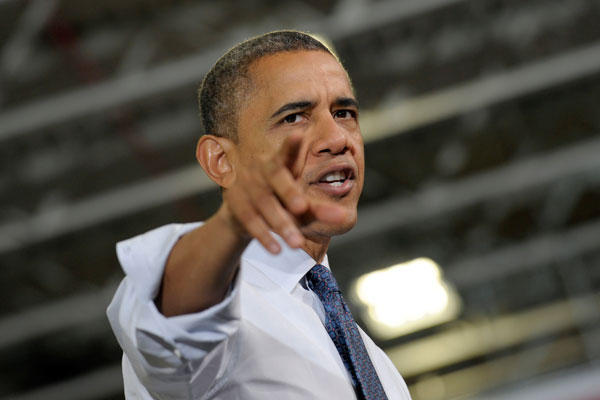
President Barack Obama has used a last-ditch White House meeting to urge Congress to back an interim plan to avoid the “fiscal cliff”, reports say.
Barack Obama reportedly asked Republican and Democratic leaders to back tax cuts for those earning under $250,000.
They have only four days to reach an agreement before across-the-board tax rises and spending cuts take effect.
Analysts say sliding over the “cliff” could tip the US into recession and set back the global economic recovery.
There appeared to be no immediate resolution after the meeting, but Barack Obama is due to make a statement at 17:45 EST.
Barack Obama cut short his holiday in Hawaii to resume the negotiations. The Senate returned to work on Thursday, with the House due back on Sunday.
Reports ahead of the meeting suggested the president would propose a limited package including the renewal of most expiring tax cuts, and a delay or replacement of some spending cuts.
But as the meeting at the White House began, US media reported that the president was making no new offer, instead seeking a simple vote on extending tax cuts for middle class Americans.
There was no word on whether Republican House Speaker John Boehner and Senate minority leader Mitch McConnell were open to a deal or had a counter-offer.
Democratic Senate majority leader Harry Reid and senior House figure Nancy Pelosi were also at the White House.
Earlier, there was upbeat rhetoric from some senators.

“I’m getting a little more optimistic today. Sometimes it’s darkest before the dawn and there are two good signs for optimism today,” senior Democrat Chuck Schumer told NBC’s Today show.
Republican Jon Kyl told Bloomberg News: “Everybody recognizes we’re either going to get something in the next few hours or not. There’s no more posturing time left.”
Barack Obama’s plans to increase taxes on the wealthiest Americans have remained a point of division between the two parties since he won re-election in November.
Many Republicans oppose new taxes as a matter of principle, and are demanding cuts to what they see as deficit-inflating public spending, putting at risk healthcare and welfare benefit schemes popular with Democrats.
An alternative plan proposed by House Speaker John Boehner – which would have seen taxes rise only on those earning over $1 million – failed in the House of Representatives late last week.
Speaking on Thursday, the Democratic majority leader in the Senate, Harry Reid, said he thought a deal was unlikely. Later, Senate Republican leader Mitch McConnell said his colleagues were unwilling to sign a “blank cheque”.
“Hopefully there is still time for an agreement of some kind that saves the taxpayers from a wholly preventable economic crisis.”
In the Senate chamber on Thursday, Harry Reid said the requirement to get at least 60 of 100 votes to move to a vote on any legislation almost certainly doomed any new plan unless Republicans gave it strong backing.
“It looks like that [the fiscal cliff] is where we’re headed,” Harry Reid said.
The term fiscal cliff refers to the combination of almost $600 billion of tax rises and spending cuts due to come into force on January 1st 2013 if Congress does not pass new legislation.
Sweeping tax cuts passed during the presidency of George W. Bush will expire, eventually affecting people of all income levels, and many businesses.
Other tax cuts and benefits to expire include:
- A 2010 payroll tax cut, the expiration of which would prompt immediate wage-packet cuts
- Benefits or the long-term unemployed
- Compensation for doctors treating patients on federal healthcare programmes
- Inheritance taxes are also likely to be affected if no deal is reached.
In addition, spending cuts mandated by a law passed to break a previous fiscal impasse in Congress will come into force, affecting both military and domestic budgets.
The cuts are expected to affect federal government departments and the defence sector, as well as hitting unemployment insurance and veterans’ support.